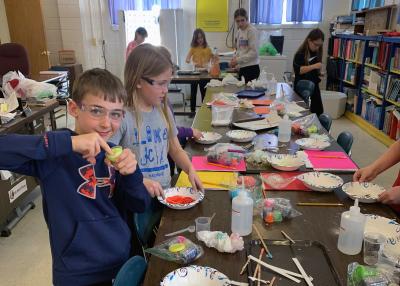STEM CARES re-invigorates rural communities through youth development

With the goal of re-invigorating rural communities following the pandemic, STEM CARES addressed the needs of communities across the state, provided paid jobs and professional development for teens, and delivered high-quality learning experiences to children. STEM CARES engaged young people across 21 counites through after-school programs, day care centers, summer school programs, 4-H clubs, and libraries. The program was provided at no cost to parents or program providers through the Coronavirus Aid, Relief, and Economic (CARES) Act funding.
STEM CARES implemented a multitiered model of education that engaged young people of all ages as learners, instructors, and leaders.
In seven seasons of programming, STEM CARES engaged nearly 1,500 children in high-quality, hands-on science, technology, engineering and math experiences. 92% of children said they learned new things about science, and 81% said they learned new things about engineering. STEM CARES offered four curriculum options consisting of six lessons each. Curriculum options included Garden Engineering, The Power of the Wind, Mechanical Engineering, and Slime Engineers. The program providers selected the curriculum topic based on their community's needs.
Teens, hired as instructors, facilitated all the programming. Before engaging with learners, teens participated in approximately six hours of training to grow their skills working with elementary students in informal settings. Teens developed a greater sense of community and explored potential careers. They gained real-world experience in child development, child care, or STEM-related careers, and many expressed an interest in teaching or working with youth as a significant part of their future career goals.
“Having this teaching experience and time working with youth were very beneficial to me as I am pursuing a degree to be an art teacher,” shared a program instructor from Hamilton County.
University of Nebraska–Lincoln undergraduate students served as mentors to the teen facilitators. As instructional leaders, the college students provided ongoing support, guidance, and reflection opportunities for the teens. Instructional leaders also participated in training and received continued support from Nebraska Extension 4-H Youth Development faculty. The undergraduate students developed their skills around facilitation, STEM-related content, and communications.
"My instructional leaders were very helpful in many ways, but I think the most helpful thing they provided for my learning was the way they taught," shared one teen instructor. "They made sure we understood the lessons they were teaching us, and if we didn't, they would explain it in a way that could help us understand it."
STEM CARES was developed by Nebraska 4-H in collaboration with Beyond School Bells. For more information, visit 4h.unl.edu/stem-cares.